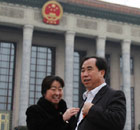-
-
China Daily E-paper
Liu Shinan
Unqualified colleges must be shut down
By Liu Shinan (China Daily)
Updated: 2010-03-12 07:09
 |
Large Medium Small |
The last day of February, I was driving past the gate of the "Langfang University City" in Hebei province when my car was stopped by hordes of students, back from their vacation, crossing the street in front of the "city".
The spectacular scene instantaneously reminded me of a colossal statistical figure I read from the media a few weeks ago - 6.31 million students will graduate from universities and colleges this year to join China's army of job seekers. I can't help but worry about their outlooks on employment, given the well-known fact that nowadays a college graduate holds a slimmer chance of landing a job than a rural migrant worker.
Such a hefty assemblage of graduates is the result of a strategy education authorities adopted 11 years ago to enlarge college enrollment. That strategy has been controversial ever since. Critics said it was too ambitious for China's educational resources. Many people have attributed the grim situation of employment in recent years to the adoption of the policy.
The Ministry of Education defended the policy by saying that it has yielded positive results. Last week, an official from the ministry said the expanded enrollment over the past decade had prepared a large reserve of talents for the country's scientific and technological advancement as well as "provided opportunities for millions of young people to go to a university and thus changed their lives" .
This general statement may not be wrong to a degree, but perception of the matter differs.
Before the new policy was taken in 1999, the enrollment rate was low. It was 6.1 percent in 1979, the third year after China resumed the practice of recruiting college students through unified national examinations, which had been suspended for 11 years during the "cultural revolution". In the 1980s and 1990s, the rate climbed to around 20 percent. The enrollment soared by 48 percent in 1999. The next year, the enrollment rate exceeded 50 percent. Last year, it was 62 percent.
The high enrollment rate means that more than half of senior high school graduates can realize their dreams of going to a university. That is something their predecessors would have envied in the years before 1999. But the reality is rather different from what the dream seems to be.
The students who benefited from the policy of enrollment enlargement were those whose performances in the national examination would have disqualified them for a regular university or college. The universities and colleges they were enrolled in were actually newly established colleges or branches of old universities.
Hastily set up in the campaign to enlarge university enrollment, these schools are far more inferior in quality in terms of both campus facilities and academic caliber of the teaching staff. Many of these schools cluster in a "university city" like the one in Langfang. They were set up with the motive of earning money in the name of developing educational industry, a concept that was rather trendy during the mid-1990s but has turned so upside down in recent years that nobody has come out to claim glory for it.
After having spent a few years in these young universities and colleges, students found that they had not learned much, though their parents had paid dearly for their fees and meals. And they found they had a very hard time finding a job after graduation because their schools were unheard of for employers.
What does such "enrollment enlargement" actually mean to students in these schools? It may have given them a chance to realize the university dream that they would otherwise miss but they may need to reflect on the matter more, given what they have invested and learned in the three or four years and the prospect of employment they will face.
The China Youth Daily conducted a survey about college education in 2007. Of the 8,777 questioned, 51.5 percent said they "have not learned any useful knowledge" in the college and 34.7 percent "regretted" having attended college.
Admittedly the enrollment enlargement campaign has contributed somewhat to popularizing higher education in China. But all the drawbacks, malpractices, cheating and profiteering found in the new campuses reflect the poor management and supervision of education authorities.
Earnestly investigating the quality of teaching in those universities and colleges set up during the enlargement process and resolutely closing unqualified ones is what the Ministry of Education must do instead of defending itself on the matter and attempting to keep itself clear of the notorious idea of developing the education industry.
E-mail: liushinan@chinadaily.com.cn
(China Daily 03/12/2010 page9)









